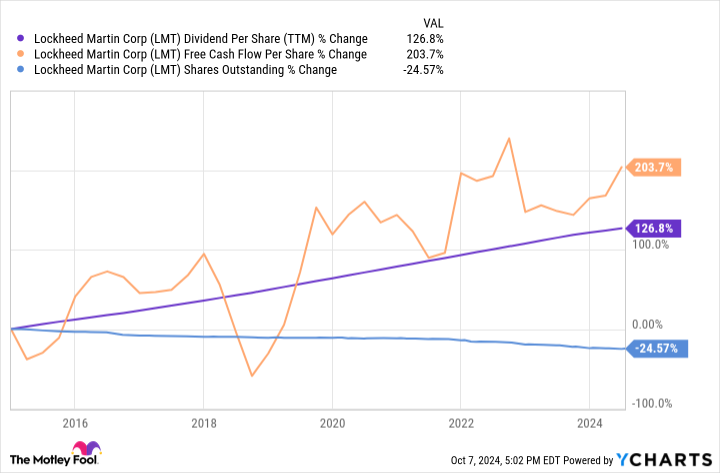Dividend investing is a tried-and-true strategy for building long-term wealth. It may not be as sexy as buying the hottest hyper-growth stocks or cutting-edge technology companies, but dividend stocks can be the tortoise that drives steady portfolio wealth when looking at a multi-decade period. And it does take time. For example, if you buy a dividend stock yielding 2% that grows its dividend per share by 6% per year, it will be yielding just 3.6% in 10 years. But if that same compounding occurs for 30 years, your initial investment will be yielding over 11% at the end of the time period.
This may not seem like much for investors accustomed to fast-paced tech stocks, but you should remember that dividend growth stocks will be paying you out a cash payment every year that you can choose to keep in cash or reinvest in a dividend reinvestment program (DRIP). This is the steady compounding that can turn a boring stock into a millionaire-maker investment.
Perhaps the perfect dividend growth stock is Lockheed Martin (NYSE: LMT). The aerospace and defense contractor has grown its dividend payout at a steady rate, leading to a total return (including dividends) of close to 5,000% in the last 30 years. Here’s why you should buy this dividend growth stock and never sell.
Lockheed Martin: The premier aerospace defense contractor
To understand Lockheed Martin, we need to understand the defense and aerospace government contract business. Typically, the U.S government will make a proposal for a technology or defense system (for example, a fighter jet) that private companies can bid on. There will also be subcontracts and the ability to sell these products to U.S. allies. Once these contracts are in place, they can last for many decades as the company builds, sells, and maintains these product platforms.
Lockheed Martin is the largest defense contractor in the U.S. with a focus on aerospace systems. It is the lead contractor for the F-35 fighter jet, which is the current-generation fighter jet that the U.S. government is spending hundreds of billions on over many decades. As one of the longest-standing defense contractors with a reputation for technological innovation, Lockheed was able to secure the F-35 deal over competitors such as Boeing.
On top of aerospace, Lockheed also has programs for space exploration, missiles, and mission systems. All four segments are profitable for Lockheed, generating a combined $8.5 billion in operating income in the last 12 months. With the long-term deals in place across these programs, Lockheed Martin has a massive backlog of $158 billion that will provide predictable earnings for many years into the future.
Predictable dividend growth
Dividend growth is powered by earnings growth. Lockheed Martin has predictable earnings growth because of these long-term government contracts. Let’s use the earnings metric free cash flow per share and compare it to Lockheed’s dividend per share.
Free cash flow per share has grown by 204% in the last 10 years at Lockheed Martin. This is the fuel for growing dividend payments. No cash flow, and the dividends can’t get paid. It’s that simple. In conjunction with this cash-flow growth, Lockheed’s dividend per share has grown by a cumulative 127% in the last 10 years. Interestingly, cash-flow growth has greatly outpaced dividend growth for Lockheed, which should tell investors that the company could have grown its dividend payout faster than it actually did.
With free cash flow per share of $28.46 over the last 12 months and a dividend per share of just $12.45, Lockheed Martin can keep growing its dividend for many years even if free cash flow per share growth stagnates. However, as discussed above, these long-term contracts make it extremely unlikely that Lockheed’s earnings will stop growing anytime soon.
Don’t forget share repurchases
The cherry on top of Lockheed Martin’s dividend growth is the company’s share repurchase program. Share repurchases make a stock’s share count decline, which means you have fewer shares to pay dividends to. This makes it easier — all else equal — for a company to keep growing its dividend per share. Lockheed has been repurchasing stock for years, with shares outstanding down by around 25% in the last 10 years. As this continues, the dividend per share you get as a remaining shareholder should keep growing as well.
Right now, Lockheed Martin stock has a dividend yield of just 2.1%, which does not look very mouth-watering. However, with its history of dividend growth, this can be a huge winning stock for investors who plan to buy and hold for many decades.
Don’t miss this second chance at a potentially lucrative opportunity
Ever feel like you missed the boat in buying the most successful stocks? Then you’ll want to hear this.
On rare occasions, our expert team of analysts issues a “Double Down” stock recommendation for companies that they think are about to pop. If you’re worried you’ve already missed your chance to invest, now is the best time to buy before it’s too late. And the numbers speak for themselves:
-
Amazon: if you invested $1,000 when we doubled down in 2010, you’d have $20,855!*
-
Apple: if you invested $1,000 when we doubled down in 2008, you’d have $43,423!*
-
Netflix: if you invested $1,000 when we doubled down in 2004, you’d have $392,297!*
Right now, we’re issuing “Double Down” alerts for three incredible companies, and there may not be another chance like this anytime soon.
*Stock Advisor returns as of October 7, 2024
Brett Schafer has no position in any of the stocks mentioned. The Motley Fool recommends Lockheed Martin. The Motley Fool has a disclosure policy.
Want a Decade of Growing Passive Income? Buy This Dividend Growth Stock and Never Sell. was originally published by The Motley Fool

